Научно-исследовательская работа "СМС как способ изучения английского языка" 8 класс
Municipal Budget Establishment
Secondary School № 1 Tumbotino
Section Philology (Foreign Languages)
The Research Work
The research issue:
“SMS LANGUAGE AS A WAY OF STUDYING ENGLISH”
Carried out by: Gomulin Maxim,
Form 8 ”A”
The supervisor of the research work:
Kutina Ludmila Nikolaevna, the teacher of the English language
Tumbotino
2014
Content
Appendix № 2. Results of the sociological survey. 16
The brief dictionary of SMS language for studying by schoolchildren. 22
Introduction
The development of modern technologies such as mobile phones and Internet has a great influence on the language, in particular on its spelling. The whole information is shortened to its minimum to save time and money. Experts say the growing trend of SMS language among teenagers has paved the way for a new type of language.
Now, it seems to be gaining a lot of popularity among all class of people. Language experts are of the opinion that SMS has led to a creation of a new form of language and way of communication.
Over the past ten years, the short message service (SMS) has become a popular tool of communication. For many people the opportunity to send short messages is preferable to phone calls.
SMS language has become so popular that mass-media arrange SMS poems competitions; in Great Britain there is a book, devoted to art of reductions; philologists from the Oxford university include lexicon used for drawing up SMS messages in the brief Oxford dictionary; the firm Genie is publishing the first-ever dictionary of the most used SMS reductions [8].
In this connection researching the phenomenon of SMS language as a way of studying a foreign language is represented actual and noteworthy.
That is why the aim of the study is to find out if using SMS language is a convenience or a corruption for studying English, to reveal positive factors, and also to create a brief dictionary of SMS reductions for studying by schoolchildren.
Therefore I have formulated such problems:
to study the theoretical material: history of SMS language; SMS devices; key rules for drawing up SMS language.
to analyze using SMS language: the pros and cons.
to conduct a sociological survey of Russian-speaking schoolchildren on the theme «Use of SMS language while studying English».
to define advantages and lacks of SMS language for studying English.
to make a brief dictionary of SMS language for studying by schoolchildren.
The object of the research is SMS language as a modern way of communication.
The subject of the investigation is influence of SMS language on studying English.
Research Hypothesis.
Studying English SMS language helps schoolchildren to learn better features and an originality of the foreign language, promotes development of certain linguistic skills.
I used theoretical and practical methods of research: the comparative analysis of literature, brainstorm (formulating the aims of research and hypothesis), observation, sociological survey, measurement, classification, generalization, analysis.
The research consists of theoretical and practical parts. The theoretical part represents studying the phenomenon of SMS language. I conducted the classification of SMS reductions and devices. The practical part brings forward the results of sociological survey and the dictionary of SMS language for studying by schoolchildren.
The basic part
I stage. Studying the theoretical material
History of SMS language
SMS language or Textese (also known as txtese, chatspeak, txt, textspeak, txtspk, txtk, texting language, or txt talk) is a term for the abbreviations and slang most commonly used due to the necessary brevity of mobile phone text messaging, though its use is common on the Internet, including e-mail and instant messaging. It can be likened to a rebus, which uses pictures and single letters, or numbers to represent whole words.
The first message was sent in 1992 on channels of European network GSM. The engineer of the firm Vodafon sent the first SMS message: «Merry Christmas – 92 ».
However this new technology was forgotten for the whole 8 years. And only in the year 2000 the cellular companies introduced Short Message Service.
SMS language devices.
Apo copes (type of truncation of final syllables):
Mom (mo)-moment; A3-anytime, anywhere, anyplace; 4e – forever
Abbreviations (alphabetic abbreviations where each letter is read like in the alphabet):
Bbl – be back later; Nc–no comment; Btw–by the way
Acronyms (alphabetic abbreviation which is read as a uniform word):
Lol – laugh out loud; Bot – back on topic; Bion – believe it or not
Apheresis (type of truncation of initial syllables):
Net = Internet
Smilies – means of expressions of emotions in a text:
:-) a smile :-0 hbtu 0: happy birthday! ;-) a smile with winking :-х a mouth on the lock
Use of letters instead of the words similar to them on sounding:
b = be Ic – I see c = see U – you r = are Cu – see you y = why
Use of digits instead of separate words or the syllables similar to them on sounding.
1 = won 8 = ate 4 = for 2 = too
Replacement of a syllable with a letter or a digit:
great = gr8 B4 =Before mate = m8 2d4 =To die for
wait = w8 4е =Forever later = l8r or l8a 2l8 = Too late
skate = sk8 once = 1ce skater = sk8r before = b4
Removal of vowels from a word without damage to recognition:
btwn = between
Symbols
@ = at sch%ll = school
Key rules for drawing up SMS-reductions:
to reduce words as far as possible:
wd=would Tho=though Ppl=people Pls=please Spk=speak
To use a letter instead of a word where it is possible:
u=you I=I/it R=are B=be C=see/sea
To use digits instead of letters where it is possible:
0=nothing w8=wait 2=two, to, too D8=date 2DAY=today F8=fate
A3=anyplace, anytime, anywhere Gr8=great L8r=later L8=late
To use symbols:
sch%l=school c%l=cool
To use abbreviations in long sentences:
ATB= All the best Ti2GO= Time to go B4N= Bye for now TIA= Thanks in advance
II stage. The analysis of using SMS language
Spheres of use SMS reductions
Despite of using SMS in a number of some European companies, according to all available information in business sphere, SMS language didn’t get accustomed. Experts consider, that SMS language is a way of informal dialogue which does not promote a successful establishment of business contacts (it would be not correct to use it, for example, for official invitations).
Nevertheless, popularity of SMS-slang is so great, that it began to make a serious influence on the modern English language. Even more there is a substitution of alive language by language of abbreviations and symbols. There are translations on SMS language of Shakespeare works, which are called to draw attention of the British students and schoolchildren to help them to understand better the classical literature and more effectively to prepare for examinations [9.]
The pros and cons
Thus, mobile communication and original SMS language get into the most different areas of our life, influencing on culture as a whole. It is possible to consider some aspects of this influence positive, and other aspects cause alarm in the public.
Opinions of people were divided: experts of education, scientists-philologists, sociologists, psychologists, even doctors enter polemic.
Popularity of SMS language causes fear among linguists considering, that the slang is widely used among schoolchildren whose language culture is not finally generated. “Pupils write the same way as they think” (Goldenkov, 1999). From the linguistic point of view SMS language is full of reductions, punctuation, grammar, and capitalization are largely ignored.
Welsh journalist and television reporter John Humphrys has criticized textese as "wrecking our language". The author cites ambiguous examples such as "lol" which may mean "laughing out loud" or "lots of love", depending on the context in which it is used. Humphrys describes emoticons and textese as "irritating" and essentially lazy behaviors, and surmises that "sloppy" habits gained while using textese will result in students' growing ignorance of proper grammar and punctuation.[5]
David Crystal has countered the claims that SMS has a deleterious effect on language with numerous scholarly studies. Despite scholarly research to the contrary, the popular notion that text messaging is damaging to the linguistic development of young people and to the English language itself persists.[6]
Hence, present young generation practicing a new way of self-expression through SMS language, in the future become illiterate experts.
Teachers are anxious by the developed position and insist on eradication of text messages in favour of preservation of classical language.
The experts concerned on the future of literary English language, consider, that similar experiments can render destructive influence, both on formation of the young person, and on educational process as a whole.
According to researches of the American psychologists studying for a long time "SMS-psychology", there is a formation of conditional "SMS-dependence" which starts to appear if the person who sends more than five messages for one day. In experts opinion, it means fear of contacts “eyes - in eyes” and attempt of flight from a reality [3].
At the same time there is the other point of view on that problem. The group of scientists in Britain accepts this phenomenon, believing that “the new kind of language has already settled, and they include the list of reductions in the new Oxford dictionary [12].
The most suitable way of solving that problem was found in Scotland. At Glasgow University there is an experiment – texting courses.
With help of scientists the program and rules of telephone slang is developed. In the future they plan to draw up the standard of a writing to make messages more universal and clear for all [13].
Moreover the online dictionary of acronyms, confirms, that reductions is one of productive ways of word-formation in the modern English language. The dictionary exists for 10 years and is the greatest and the most authoritative web site.
The broad audience of users comes on this site in searches of interpretation of the reductions used in different spheres. Monthly about 1 million visitors from 180 countries receive the competent information on more than 3 million inquiries about acronyms and abbreviations.
Acronym Finder contains over 550000 terms, and their quantity increases, on the average, 200 new units a day. Students and teachers, government officials, pharmacists, translators and any person who had problems with decoding abbreviations use the dictionary [14].
There is one more opinion of psychologists on that kind of hobby. They consider it as a new way of the self-expression, convenient means for realization of needs in the world of new technologies.
From the linguistic and psychological point of view SMS texts is the phenomenon more likely positive.
The person writing SMS message solves a little bit important problems, besides simple transfer of the maintenance [3].
III stage. The sociological survey of Russian-speaking schoolchildren on the topic «Use of SMS language while studying English».
With the view of definition of a place of SMS-language in teenagers’ lives and its importance for studying English I conducted a survey among 142 schoolchildren at the age of 11-17 years old. The questionnaire consisted of following questions:
1. Do you use ICQ or SMS languages in Russian?
2. Why do you use ICQ or SMS languages in Russian?
3. Why don’t you use ICQ or SMS languages in Russian?
4. Do you use ICQ or SMS languages in English?
5. Why do you use ICQ or SMS languages in English?
6. Why don’t you use ICQ or SMS languages in English?
7. Would you stop using ICQ or SMS languages if you know that it makes your learning English corrupt?
8. What kinds of English SMS language do you often use?
9. Does your knowledge of English influence your SMS language?
10. Do you learn new English words, using English SMS language?
11. Does SMS language help you improve pronunciation of English words?
12. Does English SMS language cause problems with spelling?
As a result of the questioning it was found out, that all students use Russian SMS messages, and in English - about 75 % of children.
Some students don’t use English SMS language because it is impossible precisely express ideas, not all interlocutors use English SMS language.
The overwhelming part of schoolchildren uses Russian SMS language for convenience and economy of time. And they use English SMS language for convenience, economy of time, because of fashion and for entertainment.
The most part of students prefer such kinds of reductions as emoticons, use of letters or digits instead of words, combinations of letters and digits in words, abbreviations in English.
70 % of respondents consider that SMS language can’t negatively affect their knowledge of English.
76 % of students consider that their knowledge of English influence on SMS language. And on the contrary SMS language very often helps to learn new English words for 48 % of schoolchildren and sometimes for 52 % of respondents.
As for the question about improvement of pronunciation with help of SMS language 75 % of respondents are sure that SMS language very often helps and 25 % of children think, that SMS language sometimes helps.
But 90 % of students believe SMS language causes spelling problems.
Analyzing results of questioning from the point of view of age I have come to following conclusions: the greatest popularity of SMS reductions in the Russian and English languages appears among teenagers from 13 till 17 years.
Considering the reasons of using SMS reductions in two languages, it is visible, that basically 13-17year old children use them for convenience and economy of time. 11-12 year old students use Russian SMS language because it is fashionable and they use English SMS language for fun. Most 11-13 year old children do not use English SMS language because of difficulty of this language, impossibility to express precisely idea and whereas not all people use it. 14-15 year old teenagers mention unpopularity of English SMS language among youngsters.
As for negative influence of SMS language on studying English the overwhelming part of 11-12 year old children do not agree.
The least popular ways of SMS reductions for all students are apocopes and «removal of vowels from words» And the most popular ways are emoticons. 11-year old children equally prefer all other ways. 12-13 year old students prefer abbreviations, “use of letters and digits instead of words”.
14-year old teenagers choose such ways as “use of letters and digits instead of words”, and also a combination from letters and words. 15-year old teenagers use abbreviations, combinations from letters and words. 16-17 year old students often use abbreviations, “use of letters and digits instead of words”, and also their combination. Thus, students of senior grades use a wide range of SMS reductions.
Most of 14 -17 year old students agree that knowledge of English influence on SMS language. A half of 11-13 year old children do not agree. All students agree that SMS language influences on learning new English words. All age groups equally agree that SMS language improves pronunciation of English words. A half of students think that SMS language causes problems in spelling. The smaller part of 13-17 year teenagers do not think so.
IV stage. Definition of advantages and lacks of using SMS reductions during studying the English language.
For conclusion about use of SMS language while studying English I familiarized with opinions of different experts and I used results of questioning.
John Levis considers that in connection with a lot of exceptions in rules of reading in the English language, new ways of the image of words facilitate storing a pronunciation of words [6].
The writer Georges Bernard Show suggested entering the graphic representation for each sound, so to increase quantity of letters in the alphabet [6].
In the USA simplification in spelling already occurs. Linguist Noj Vebster, considers, that unpronounceable letters in words should be withdrawn [6].
Teachers from Kampala faced cases of using SMS language by schoolchildren at examinations that was reflected in low results [7].
According to Andy Karvin some universities start studying an opportunity of using SMS for delivery of lectures as remote training [11].
Кobus van Wyk informs that the question of using mobile devices in training is considered. As, if the pupil with impatience reads or writes by means of SMS, it would be possible to take advantage also precisely of this opportunity for the good education [11].
However some teachers of Science consider that SMS-language is convenient in the technological world [7].
Some psychologists and teachers are sure that SMS reductions develop creativity, imagination, skills to analyze [10].
On the basis of the revealed negative and positive factors of influence of SMS language on educational process and results of the questioning I have come to the following conclusions:
- English SMS language is better to study for schoolchildren who have learned English for some years;
- It is better to use selective SMS reductions which will not lead to language contradictions;
- It is convenient to use SMS language during mastering pronunciation of new words;
-It is useful to use SMS language while developing informal speech.
V stage. Making a brief dictionary of SMS language for studying by schoolchildren.
While researching the phenomenon of SMS language I studied certain quantity of SMS reductions and I made a brief dictionary of SMS reductions for studying English language. For convenience of use words and expressions are distributed on lexical sets:
- Expression of opinions; - expression of emotions; - virtual kisses; - greetings; - farewell; - the instruction of time; - expression of discontent; - people; - polite words; - questions; - conjunctions and prepositions; - verbs; - wishes; - estimation; - emoticons.
Using this dictionary students can improve learning new words and phrases, their meaning and pronunciation. Besides, the unusual way of studying and an opportunity of drawing up own reductions will cause interest to training.
Conclusion
As a result of researching SMS language I have come to the conclusion that SMS messages, despite of singularity, serve as means of communication. This phenomenon is natural, as the language is «an alive organism», constantly developing and changeable. It is difficult to say if SMS a positive or a negative phenomenon, but it is necessary to recognize the fact of existence of a kind of modern language.
SMS language should be considered not only as an element of youth subculture. Being a popular tool of dialogue, it allows removing a problem of existence in language space and it is an original source of updating vocabulary.
Therefore, despite of discrepancy of points of view, SMS language is the part of culture. It also demands theoretical judgment of philologists and psychologists to reduce its negative influence on traditional language and education.
The results of the work have confirmed the hypothesis about SMS language as a way of learning originality of a foreign language.
The sociological survey has confirmed, that use of certain SMS reductions promotes development of special linguistic skills: pronunciation skills, grammatical structures, development of informal conversation, expansion of vocabulary.
Use of SMS language at lessons recovers training; it causes interest to the language. Process of drawing up and decoding SMS reductions promotes not only fastening new material, but also develops creative abilities and skills to analyze.
Reference
1. Goldenkov M. “Hot Dog! Modern Active English”., М., 1999, 272 p.
2. Lutskevich V.A. “English-Russian Dictionary of Modern Reductions”., М., 2002, 571 p.
3. Journal “Speak Out” 1/2002, М.: GLOSSA-PRESS, 2009, 63 p.
4. http://en.wikipedia.org/wiki/SMS_language
5. http://transl8it.com/cgi-win/index.pl Словарь перевода текста на SMS язык
6. http://ezinearticles.com/?Why-SMS-Language-Isnt-So-Bad-After-All
7. http://www.independent.co.ug/index.php/society/society/37-society/231-sms-spells-end-of-gd-grammar-
8.http://living.oneindia.in/expressions/life-expressions/2009/sms-new-type-language-020709.html
SMS Lingo: The New Kind Of Language
9. http://y2u.co.uk/knowledge_information/ technology/rn_mobile_sms_texting_slang.htm « SMS language»
10. http://www.eslteachersboard.com/cgi-bin/english/index.pl?read=1918 «SMS Language - Improving Lives Or Infecting Our English?» By:Dennis Paguio
11.http://www.pbs.org/teachers/learning.now/2006/10/do_ students_need_to_learn_text.html
«Should Schools Teach SMS Text Messaging?»
12. http://library.thinkquest.org/06aug/02130/ ICQ & SMS language - convenience or corruption?
13. http://coolsms.by.ru/sokr.html
14. www.acronymfinder.com
Appendix № 1. Glossary.
An abbreviation (from Latin brevis, meaning "short") is a shortened form of a word or phrase. Usually, but not always, it consists of a letter or group of letters taken from the word or phrase.
Acronyms and initialisms are abbreviations that are formed using the initial components in a phrase or name. These components may be individual letters (as in CEO) or parts of words (as in Benelux).
Apocope - The loss or omission of a sound or syllable from the end of a word.
Apheresis is the loss of one or more sounds from the beginning of a word, especially the loss of an unstressed vowel.
An emoticon is a textual expression representing the face of a writer's mood or facial expression. Emoticons are often used to alert a responder to the tenor or temper of a statement, and can change and improve interpretation of plain text.
GSM (Global System for Mobile Communications: originally from Groupe Spécial Mobile) is the most popular standard for mobile telephone systems in the world.
ICQ is a popular instant messaging computer program, which was first developed by the Israeli company Mirabilis, now owned by AOL. The first version of the program was released in November 1996 and ICQ became one of the first Internet-wide instant messaging services. The name ICQ is a homophone for the phrase "I seek you".
Short Message Service (SMS) is a communication service component of the GSM mobile communication system, using standardized communications protocols that allow the exchange of short text messages between mobile phone devices.
Appendix № 2. Results of the sociological survey.

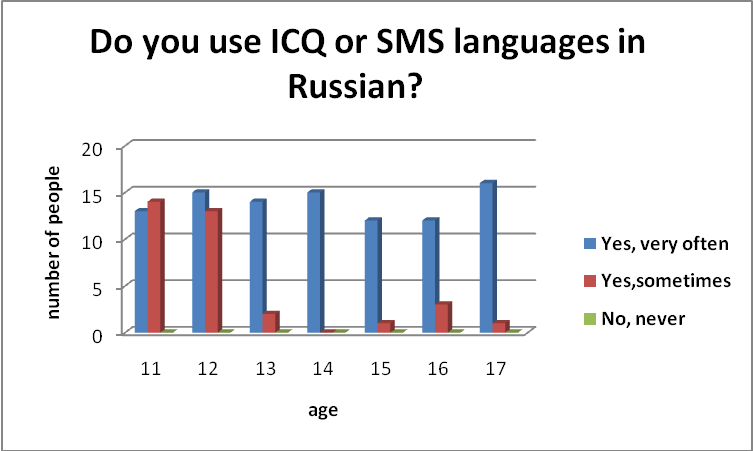
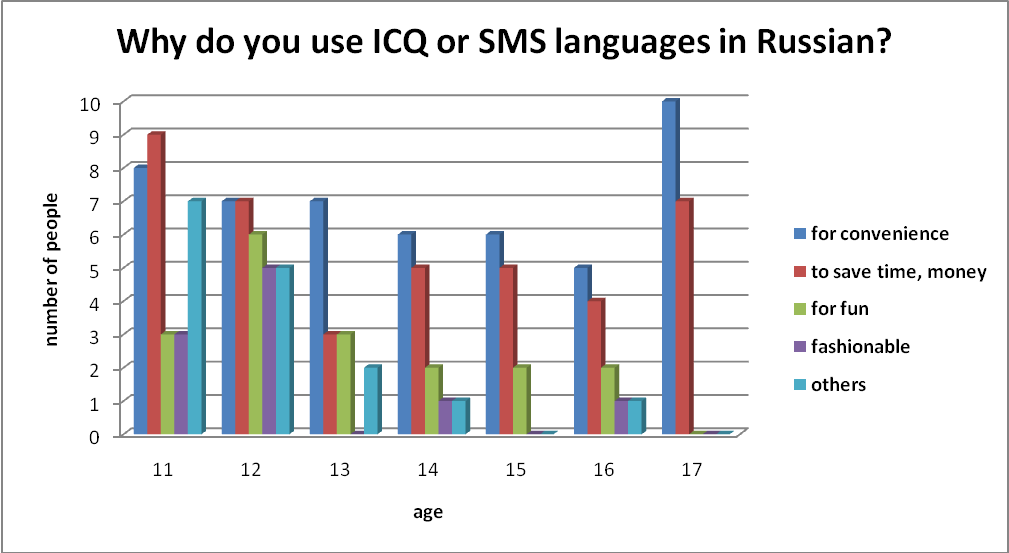
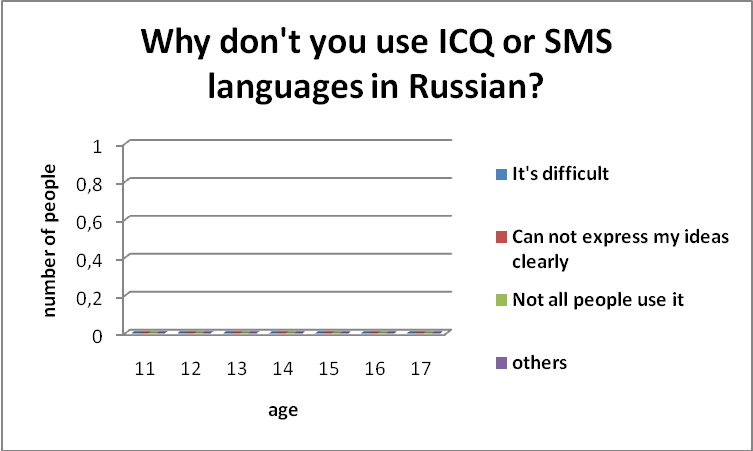
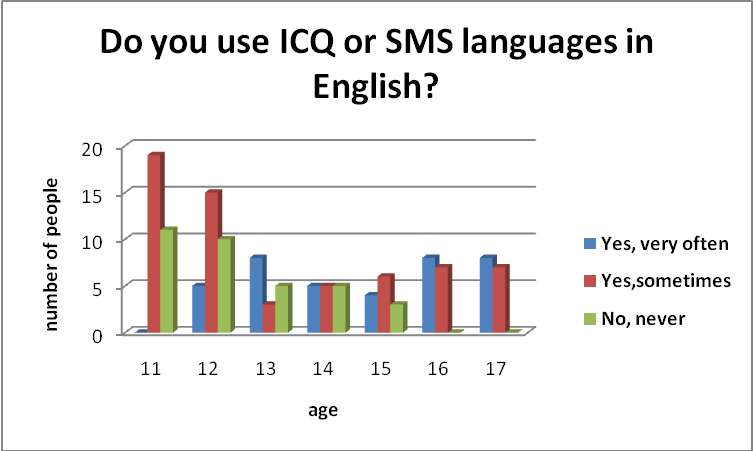
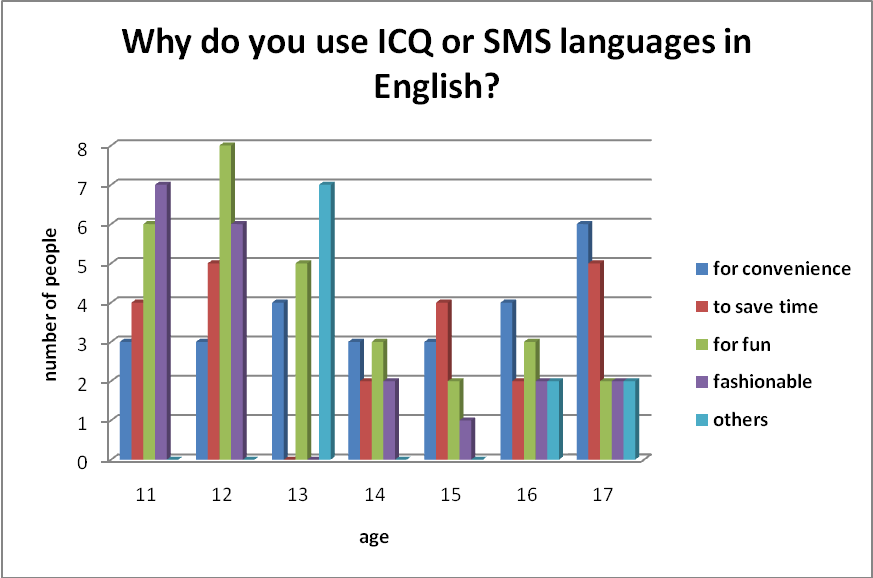
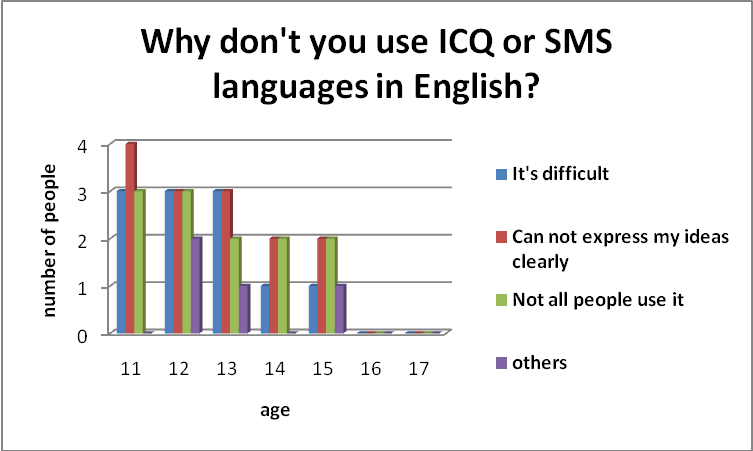
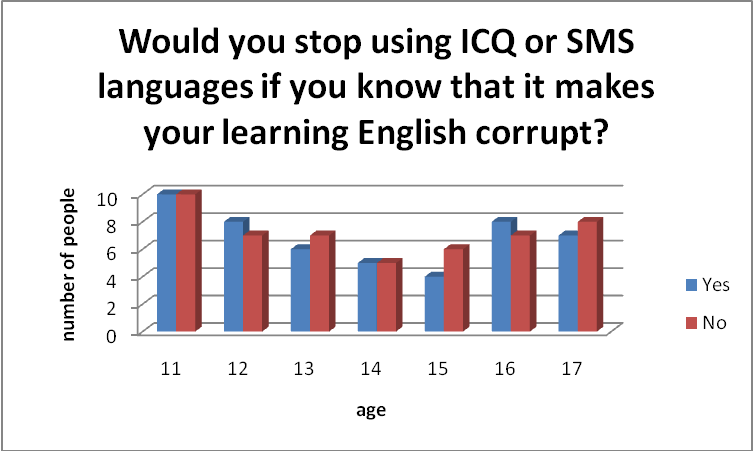
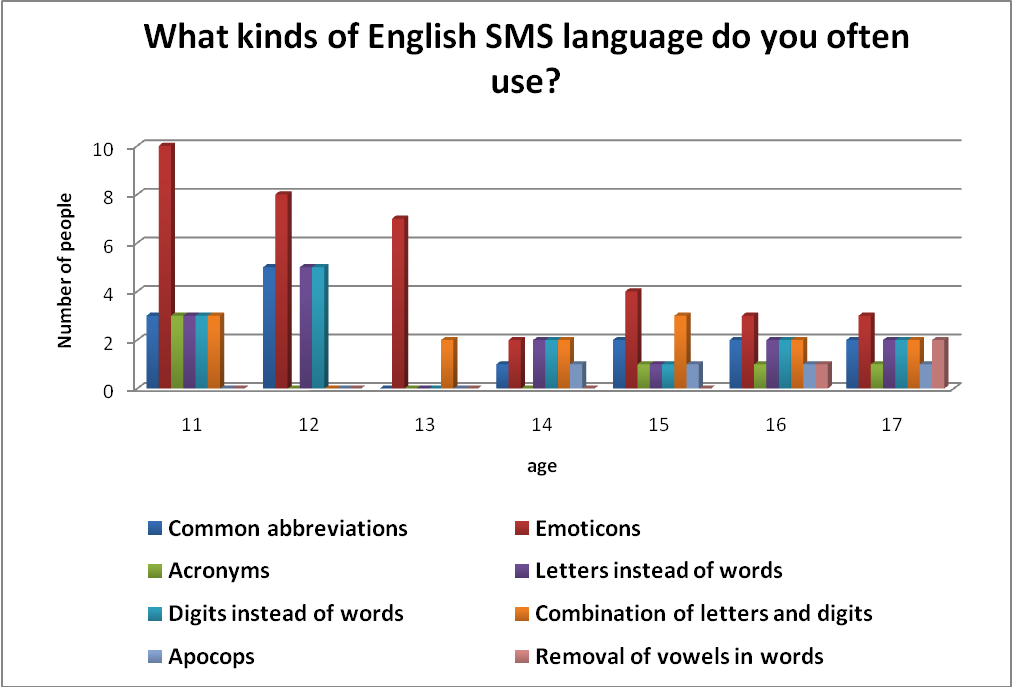
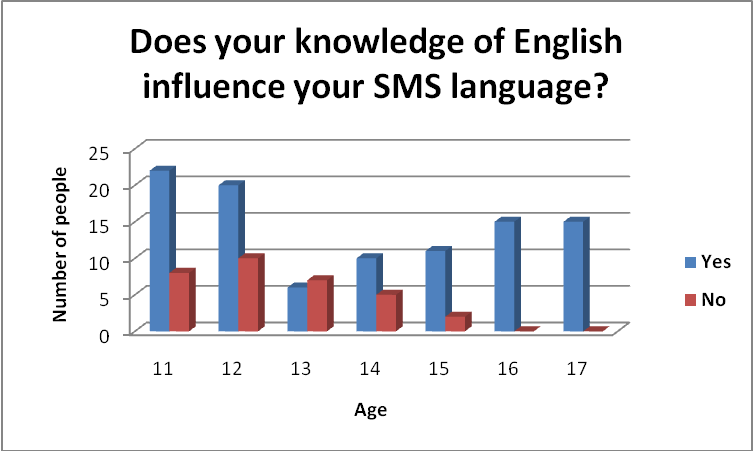
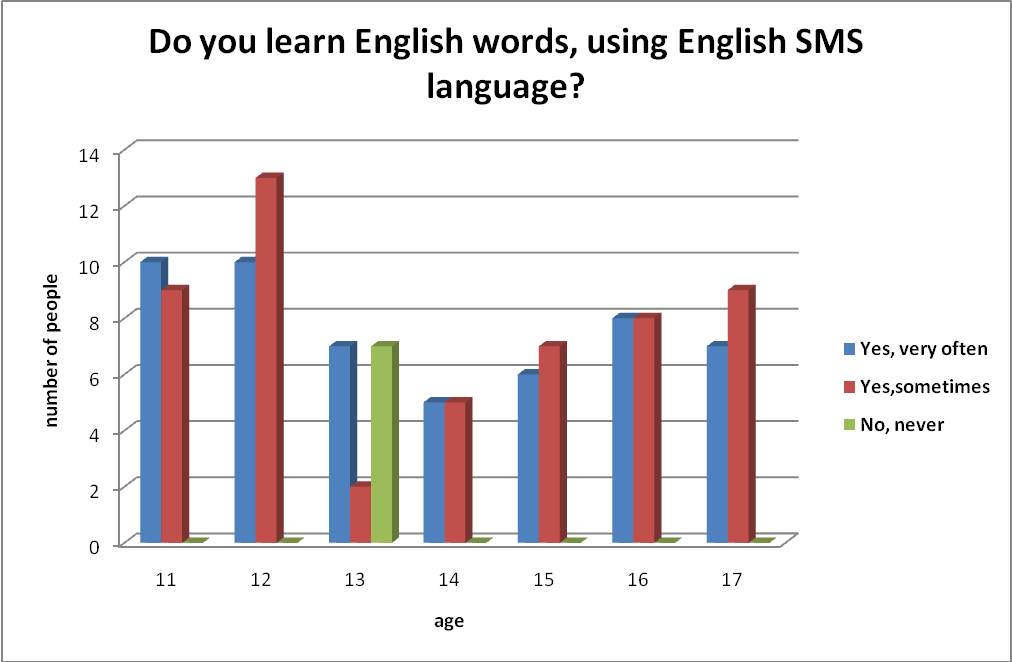
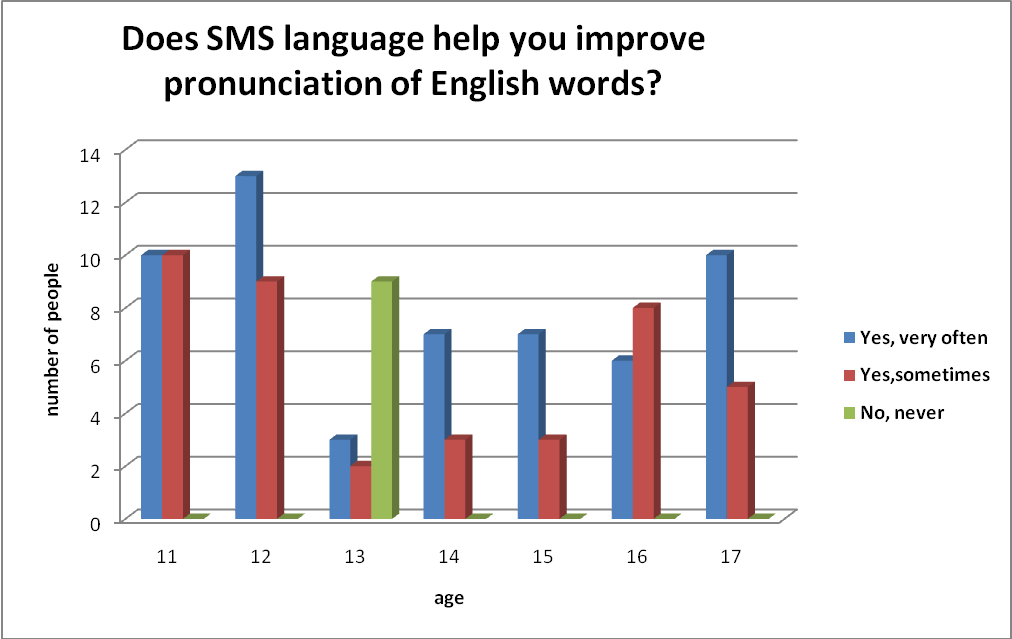
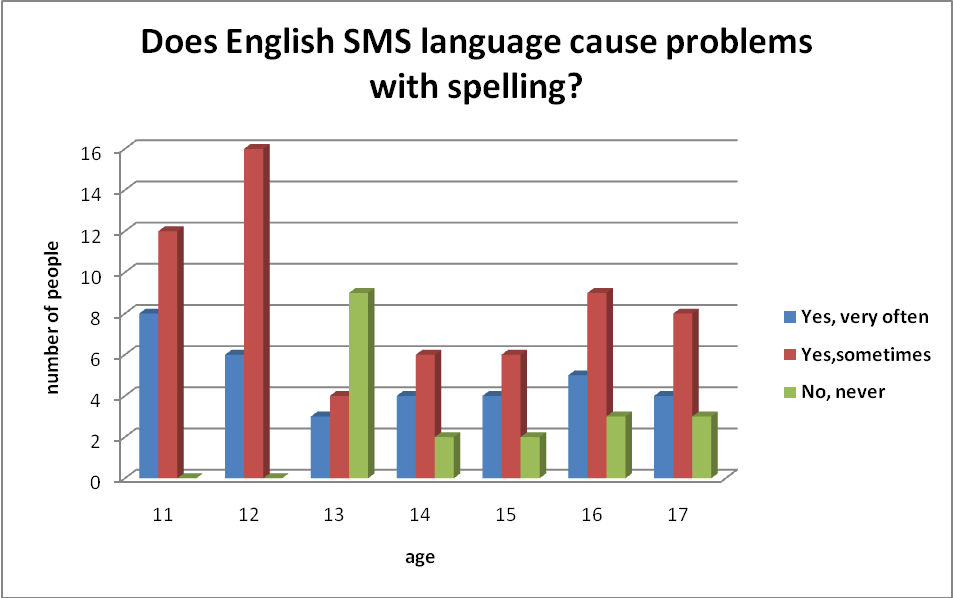
Appendix № 3.
The brief dictionary of SMS language for studying by schoolchildren.
Greetings
HOW R U?
How are you?
OK N U?
OK and you?
RUF2T
Are you free to talk?
RUOK
Are you OK?
UOK
You OK?
WU
What's up?
wb
welcome back
Expression of opinions
AFAIK
As far as I know
AFAIUI
As far as I understand it
ILBT
I will be able to
IMO
In my opinion
IMS
I must say
TBO
to be honest
NMP
Not my problem
SWDYT
So what do you think?
BICBW
But I Could Be Wrong
BTW
By The Way
IMHO
In My Humble Opinion
EMFBI
Excuse Me For Butting In
IOW
In Other Words
OTOH
On the other hand
TTBOMK
To the best of my knowledge
dk
don't know
FYI
for your information
IAC
in any case
nc
no comment
AISE
as I said earlier
IDC
I don't care
IDM
It Does Not Matter
IMPOV
in my point of view
AAM
As a matter of fact
Farewell
ATB
All the best
B4N
Bye for now
HAND
Have a nice day
Rgds
Regards
TIA
Thanks in advance
Ti2GO
Time to go
LUV B
Love,Bill.
CUL8TR
See you later.
CU2DAY?
See you today?
LMK
Let me know
PCM
Please call me
CB
Call back
BCNU
Be Seeing You
BRGRDS
Best Regards
CWYL
Chat With You Later
TUL
talk to you later
WBW
With Best Wishes
h2cus
Hope to see you soon
cm
call me
pcm
please call me
SIT
stay in touch
BB4N
Bye-Bye for Now
GL
Good luck
eod
end of discussion
B
Bye
HAGN
have a good night
HANT
have a nice time
HF
Have fun
TT
till tomorrow
BBL
be back late(r)
BCNU
be seeing you
HUMM
hope you miss me
Virtual kisses
ILUVU
I love you
ILU / ILY
I love you
MAY
Mad about you
X
Kiss
XOXOX
Hugs and kisses
Expression of emotions
Xlnt
Excellent
BK
Big kiss
FDROTFL
Falling down rolling on the floor laughing
Gr8
Great
JK
Just kidding
LOL
Laugh out loud / lots of love
Grinning
Joking
Laughing
Shouting
Smiling
Yawning
IC
I see
IK
I know
Sry
Sorry
ILUVU
I love you
The instruction of time
asap
as soon as possible
l8r
later
2moro
tomorrow
2dA
today
2NITE
tonight
WKND
weekend
4EVER
forever
ASAP
as soon as possible
nite
night
ATM
at the moment
N4E
never forever
B4
before
EOD
end of day
ATW
at the weekend
SOL
sooner or later
TNT
till next time
Polite words
thx
Thanks
pls
Please
THNQ
Thank you
Emoticons
:-||
Angry
:-(
Sad
:-)
Happy
:-))
Very happy
%-)
Confused
:'-(
Crying
:-D
Laughing / Grinning
:>
Devilish grin
{you}
Hug
:-*
Kiss
:-|
Not talking
%-}-
Silly
:/)-
Not funny
:-O
Surprised / shocked
:-*-
Oops!
Expression of discontent
LMA
Leave me alone
MYOB
Mind your own business
YBL
You'll be sorry!
GOOML
Get out of my life
People
some1
Someone
gf
Girlfriend
ppl
People
bf
Boyfriend
NE1
Anyone
NO1
Noone
YG
young gentleman
YL
young lady
YM
young man
bros.
Brother
QT
Cutie
M8
Mate
Wishes
HB2U
happy birthday to you
MC
Merry Christmas
CONGRATS
Congratulations
DWBH
don't worry be happy
Questions
wot
What
w
Why
WER
Where
WEN
When
Conjunctions and Prepositions
bc
Because
b4
before
4
for
2
to
W/
with
N
and
@
at
Verbs
njoy
Enjoy
w8
Wait
b
Be
c
See
wan2
want to
h8
Hate
x
Kiss
spk
Speak
WRK
Work
CK
Check
c%d
Could
R
Are
GOWI
get on with it
Estimation
BIC
Best in class
BZ
Busy
MBR$D
Embarrassed
ED
Emotionally disturbed
GJ
Good job
GR8
Great
ql
Cool
EZ
Easy
XLNT
Excellent

Нравится материал? Поддержи автора!
Ещё документы из категории английский язык:
Чтобы скачать документ, порекомендуйте, пожалуйста, его своим друзьям в любой соц. сети.
После чего кнопка «СКАЧАТЬ» станет доступной!
Кнопочки находятся чуть ниже. Спасибо!
Кнопки:
Скачать документ